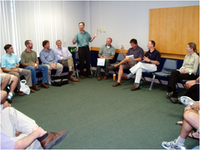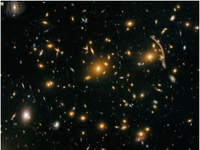Connections Review
The Semi-Annual ACI Courier
For Academic Connections, International : www.academicconnectionsgcm.org
Issue # 5, Summer 2012

In This Review:
Features inside this issue include a short essay (installment #3) that is a continuation of a topic we’ve been discussing—the value of being involved in a Christian community on campus, where you serve.
Other features include links and references to subjects we’ve been following including 1) the legal (and some political) issues which surround what’s going on at Vanderbilt University and their relationship to Christian organizations; 2) a meditation on the Hubble Ultra Deep Field in 3D; and 3) other items in the news.
Remember our policy: including of a link or reference DOES NOT constitute an endorsement. They are meant to be food for critical thought informed by the scriptures.
You are receiving this email because you either asked for it, you’ve had contact with our ministry or one of your colleagues suggested you to us a person who might be interested in knowing about this. If you would like to UNSUBSCRIBE, click on the email link below and merely put the word ‘unsubscribe’ in the subject line and you will be removed: aconnectionsi@gmail.com
Christian Communities in Academe?
We have so far given two reasons to value either starting or advancing Christian communities on secular campuses. We’re picking up this discussion from Connection Review issues #2 and #3 (the last issue, #4, was an ‘extra’ introducing some new resources and therefore did not include it).

Previously we argued that even though everybody is busy—really busy—it is very possible and even probable that the larger secular community on campus shapes how we think, do our research, raise our families and generally live life more than does the Christian community on campus. How that happens can be just a matter of the sociology of knowledge and not from the power and influence of just ideas themselves. But ideas do matter and it seems the university’s agenda(s) can and do come into conflict with some Christian ideas we hold dearly. How can we not be concerned about that conflict and its influence? Who in our local churches is qualified to understand and talk with you about these sorts of things? Why wouldn’t you want to have the added benefit of Christian peers with whom you can dialogue about these issues? A flourishing Christian faculty community on your campus could help.
A second reason of which we took note was that despite the agonistic (not agnostic) nature of academe and the focus that competition demands of us there are very few who can minister to those in the larger church who are confused about how the world of ideas and Christian ideas relate. Very few besides Christian professors are really qualified; but to do this skillfully often requires the benefit of colleagues and peers, that is, Christian colleagues and peers who can sharpen us as iron sharpens iron in fulfilling this obligation. Having a flourishing Christian community on campus can help you avoid the Lone Ranger syndrome in fulfilling this obligation.
But I also promised and will now talk about a significant hurdle to starting and seeing Christian communities flourish on campus--one that we must face. It’s the 800-pound gorilla in the room. It’s a roadblock which, if negotiated, can make a significant contribution to your life and the mood on campus.
When Christian intellectuals get together on campus we often don’t come together of one mind on many things. We come from differing denominations, historical perspectives on Christianity and theological allegiances—perhaps a theological hobbyhorse or two. These differences can create deep suspicion; in some scenarios we find battle lines drawn along the lines of the fundamentalist/modernist controversy which reached its height at the beginning of last century.
Perhaps the biggest extant roadblock to fellowship emerges when we talk about politics and suddenly realize that not all Christians are on the same page. It is so obvious if they were good Christians they would think about this sort of thing the way I do.
The typical way this last problem has been addressed is by pretending it’s not there or by making its discussion the sine qua non of all subjects to discuss. Here again, once the lines are drawn and the conversation heats up, many feel the need to withdraw. Others feel the need to dominate and make sure their side of the argument prevails.
Some communities make it past this hurdle without the acrimony that can stifle, even arrest the progress of a local community, but it’s not easy and most don’t seem to do so. A local Christian community that takes the time to acknowledge these sorts of divisions and to work through them respectfully and with tolerance can set an example for the larger body of Christ. Here a wisely and skillfully led Christian community can be a city on a hill to the secular academic world that has not successfully addressed this problem either.
In the next issue we will continue our discussion with an additional reason to form and help see Christian faculty communities on campus flourish.
Special Report on Vanderbilt--Coming to a Campus Near You
Have you been keeping up with what’s going on with the administration at Vanderbilt University and some Christian student organizations on campus?
We have created a special resource you can access for a quick catch-up with the background, the issues and the prognosis. It’s a part of our Legal Issues section of our ministry website; see AC: Court Watch at: http://www.academicconnectionsgcm.org/AC/AC/Legal.html
To access the Vanderbilt Nondiscrimination Events section directly, see: http://www.academicconnectionsgcm.org/AC/AC/Vandy.html
A Meditation on the Hubble Deep Field in 3D
If you can make time I would encourage you to take a look at this video (length 4:12) that appears on the Website, “DeepAstronomy.com”
The URL for the site and video are just below. You may have seen it, but if you haven’t, it takes you on a thought provoking journey that is aimed to give you some sense of our place in the universe: it takes a look at the Hubble Deep Field (1996) and the Ultra Deep Field (2004), but adds to the latter a 3D effect (that can be seen in 2D), which allows you to get perspective on what astronomers have measured (by means of redshift) in terms of their relative distances away.

Why look at this? The producers of the video assert that once we view this and “really understand what it means, we instantly gain the perspective and cannot help but be forever changed by it.”
And certainly it does have an effect, and I want to talk about that in a brief meditation after you’ve had a look.
Here’s the URL: http://www.deepastronomy.com/hubble-deep-field-3d.html
It could be argued that drawing meaning from the facts about the size of our universe is a little like drawing meaning from a Rorschach test…it tells you more about yourself than about the ambiguity in the drawing itself. But it doesn’t seem too far afield to interpret these facts in a way that is humbling to us because of the tiny, tiny space we occupy in a vast (even more vast than we imagined) universe.
That seems a fair interpretation—and probably the point the producers of the video wished to make. But if humanity stops there with that lesson alone, further reflection could lead to despair. After all humanity has not been around that long and will not stay around long relative to the age and future of our universe. Is it wrong from that context not to see ourselves as merely dust in the wind?
Of course, humanity hasn’t stopped there because we (at least some of us) have gone on to interpret our partial understanding of the vastness of the universe and our apparent comprehension of how the universe works as grounds for exalting ourselves. That is, exalting our accomplishments so as not to have need for the aid of the gods or God.
It’s the sort of spirit of, we figured out our place (our real place) in the universe, how the whole thing works (or we think nearly know how the whole thing works) and this says something profound about us. Like Prometheus who secured control of fire from the gods, we have through our curiosity and intelligence wrestled out a great deal of nature’s secrets, tamed our fears and reached a level where we no longer have to depend on God.
You can guess where I’m going with this, but don’t get too far ahead of me.
Alternatively we can interpret these experiences in a different way. We can see in the vastness and complexity of the universe that it would take a great mind and great power to produce a universe like this, even in its fallen state. The same is true when we reflect about humans…the wonder of human capacities and ingenuity. There is cause for awe and despair; in the latter case the despair can come when we reflect on our human fallenness, our inhumanity to each other, our pride and corruptibility.
But there is an alternative way to think about this. Surely humanity is in need of redemption, but there is a redemption available and that can be shared.
So I propose that a good take away from reflection about this (from the point of view of a Christian theist) is that God’s Creation, which includes a humanity created in the image of God, is quite awesome, even though we groan for the full redemption that is ours in Jesus Christ.
Like the Psalmist we can reflect on the universe in the following way—a theistic way:
Psa. 8:3 When I consider your heavens,
the work of your fingers,
the moon and the stars,
which you have set in place,
Psa. 8:4 what is man that you are mindful of him,
the son of man that you care for him?
Psa. 8:5 You made him a little lower than the heavenly beings
and crowned him with glory and honor.
Psa. 8:6 ¶ You made him ruler over the works of your hands;
you put everything under his feet:
Psa. 8:7 all flocks and herds,
and the beasts of the field,
Psa. 8:8 the birds of the air,
and the fish of the sea,
all that swim the paths of the seas.
Psa. 8:9 ¶ O LORD, our Lord,
how majestic is your name in all the earth!
As theists we have good reason to neither feel abandoned in a universe of this spectacular size nor seek unwisely to try to become our own gods. The constraints of our fallenness and a paradise lost need not lead us to despair. Our awareness of these things can keep us from unwisely seeking our own independent way out of it, which is the real ground for despair.
In Case You Missed It, By Category:
Articles and links do not entail or imply endorsement; they are food for thought, discussion and further research. That is, we are not agreeing with everything an article or book has to say or an author ever thought in her entire life. Look for the links embedded in the references below.
Some Site Changes:
Our previous website server recently closed its services and so last month we scrambled to put up our sites with new software and with new URLs. That has been largely accomplished, so here are a few links to make sure you can find us:
Our main site for Academic Connections: www.academicconnectionsgcm.org
The recent resources from our last issue, “Mentoring The Journey”
Two Videos On Christian Scholarship:
Dr. Alvin Plantinga interviewed on Christian conduct and the academic totem pole (Biola University): http://www.youtube.com/watch?v=iQBx6asT3og&feature=share
Legacy and Christian Scholarship: Christian Scholarship Advances in Philosophy (Baylor University): http://www.youtube.com/watch?v=fkt-xaZhSJQ&feature=plcp
Best regards,
James Cook
Editor
For Academic Connections
AC: www.academicconnectionsgcm.org
email: cookj3@mac.com